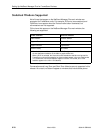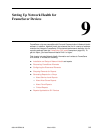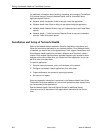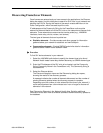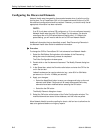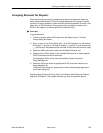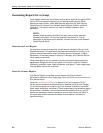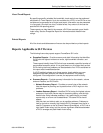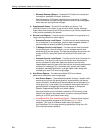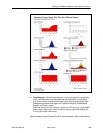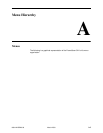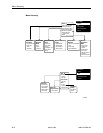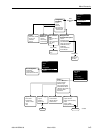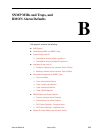
Setting Up Network Health for FrameSaver Devices
9-8
9664-A2-GB20-00
March 2000
— Elements Summary Report – Compares DLCI traffic with volume and
the baseline, bandwidth utilization, and errors.
Use this report for DLCI detail information and comparison, to identify
DLCIs with above or below average volume so they can be investigated
when there are any significant changes.
H Supplemental Report – Shows DLCI availability and latency. The
information shown in this report is also on other Health reports. However,
these charts show more than ten DLCIs at a time so you have a broader view
of the service provided by the network.
H Service Level Reports – Provide summary information for a group list for a
longer reporting period than other reports.
— Executive Service Level Report – Provides service level performance
for an enterprise on a single page. Use this report to assess whether IT
service levels are meeting availability and service goals.
— IT Manager Service Level Report – Provides service level information
for various groups. Using this report, you can compare service level
performance of various groups. The report summarizes service levels for
a group of DLCIs, along with details on individual DLCIs within that
group.
— Customer Service Level Report – Provides service level information for
customers. This report is used to provide service level information to
service customers to help them determine optimum service levels
needed based upon their own traffic data, as well as provide documented
evidence for increasing CIR. It combines daily volume, daily Health
exceptions, bandwidth distribution, average Health Index ratings and
availability for each DLCI onto a single page.
H At-a-Glance Reports – Provides consolidated DLCI and network
performance information onto a single page.
— At-a-Glance Report – Consolidates bandwidth utilization, network traffic,
events occurring over the reporting period, and availability and latency
levels information. Variables other than bandwidth can be selected for a
trend report (e.g., burst octets), but a bandwidth trend report should be
generated when investigating problems that appear on Exceptions
Reports, Supplemental Reports, and Health reports.
Use trend reports to view individual variables for DLCIs having a high
Health Index rating to help locate which variable is causing a problem
leading to a DLCI’s poor Health Index rating.
— FrameSaver SLV Plus At-a-Glance Report – Performs trend analysis
on up to ten specified variables for DLCIs (see page 9-9 for an
example). This is the first Network Health report to integrate
the FrameSaver SLV’s unique monitoring capabilities, using the unit’s
SLV-enhanced network statistics.



